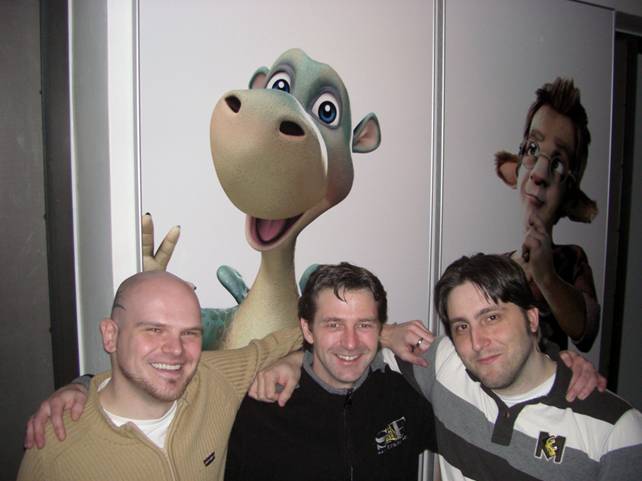Last year, three animation students from three different countries set foot into AnimationMentor.com. It took only a couple of weeks on the virtual campus and we had already become good friends. Little more than a year later, we're working together on our first animated feature at Ambient Entertainment.
This is us

Carmelo Leggiero, Italy
When he was two years old, little Carmelo received his first Atari console. Shunning Italy’s beaches, he spent all his spare time playing videogames and watching movies. Although it was his dream to work in this industry, he had no idea how he would achieve that. A few years ago, he left his home in the south of Italy to work as a pizza baker in Wellington, New Zealand. Among his regular customers where two Weta artists who introduced him to the world of VFX. When he left New Zealand half a year later, he knew that he wanted to be a Character Animator.

Michael Herold, Germany
Michael Herold has been working as a generalist both in videogames and in a commercial house that specializes in automobile products. Through a fateful coincidence, the company’s only character animation job landed on his desk. From then on, animating clutches and dampers was never the same for him again.
After reading through the entirety of an approximately one million posts long thread about Animation Mentor on CGTalk, nothing could stop him from signing up to the program!

Martin Kirkhaug, Norway
Martin Kirkhaug had been working in the Norwegian film industry for about 10 years, mainly as a video editor. He has always been fascinated by the moviemaking process, but after so many years as an editor, he felt a change was called for. Animation Mentor came along at the right time and character animation seemed like a perfect choice - still making movies, but in a totally new and challenging way.
Where are we now?
Ambient Entertainment is based in Hannover, in the north of Germany. The studio was celebrated for being the first company in Germany to produce an all CGI feature film, Back to Gaya (2004). Two years later, they had turned the popular German children’s story of “Urmel aus dem Eis” into a CG Movie (international title: Impy’s Island).
Currently, the studio is working on their third feature film – Urmel 2.
In the new film, the small dinosaur Urmel, is the undisputed center of attention of the inhabitants on the tropical island Titiwu. This suddenly changes when rivalry in the form of Babu, a small Panda girl, arrives. Conveniently for Urmel, theme park tycoon Barnaby also arrives on Titiwu, looking for an attraction for his new park. So Urmel secretly leaves his family, only to be surprised by what really awaits him there!

How does it feel to move to a different country to work?
Moving to a different country is of course difficult. First of all, you have to find a new flat while you are still hundreds or thousands of miles away (luckily, Ambient’s HR was super helpful with this). Then there’s the organizational stuff to take care of – opening a bank account, requesting a social security number and getting phone and internet access in your new place (you don't want to use the cell phone you brought from home, believe us!).
In all of this, you also have to deal with different languages. Most people here speak English – although sometimes only to a level where an extensive use of pantomime is still required (but we covered that in class 3, didn't we!?). Again, the studio’s HR agent would come with us to help out whenever necessary.
When all this organizational business is taken care of, you are still far out of your previous everyday life – in every aspect of your daily life you have to start from scratch again. Where is the next subway station? Where do I find a supermarket? Why on earth are all the shops closed on Sunday? And where the heck am I going to buy toilet paper now? But once you are settled in, the fun part of the adventure starts – there are so many exciting things to see and do.
When we signed up to Animation Mentor, we already knew in advance that one day we would have to move if we wanted to work in the industry.
How is working in a professional environment compared to studying?
Well first of all, we have decent work hours now – and weekends too. :-)
One of the biggest changes is that there is an organizational structure that we have to comply with. This is necessary so that our animation will later fit into the studio’s pipeline. There are technical requirements we have to fulfill when we constrain or parent objects, or if we animate parts of the set(for example: the chair a character is sitting in). Here we have to follow a specific workflow to set things up. This sounds more complicated than it is – once you've worked on a shot or two, it becomes second nature. Besides, you can always yell out and help comes running.
The studio is working with a production management software to organize all the data and tasks. This was something we had to learn to handle too. The supervisors use the software to assign shots to animators, and we use it to access the shots, load our sets, cameras, sounds and characters. The software also offers us access to the Maya files of every animator. If you want to see how a shot was animated, or how a particular animator works, you can just go in and get a copy of the final scene. You can even open up previous versions of the file, to see it in the state of blocking or golden poses.
As for our artistic freedom, this is no longer as unrestrained as it was at Animation Mentor. Decisions made by the director or the supervisors have to be followed down to the letter, despite all the cursing that usually comes out of the animator’s room after changes have been requested. Most of the time, the shot is indeed a lot better afterwards. Sometimes more than one animator is assigned to a scene, and in such a case these animators do need to work together closely in terms of acting choices and continuity. This is where the fun starts – because where one animator might go crazy, two or three animators go crazier!
Last but not least, we are now sharing our room with a bunch of animators. Getting a second or third pair of eyes to look at your shot is as easy as yelling out, "Anyone wanna give me some feedback?" – and a few seconds later you have a cluster of curious animators behind your monitor. There's always an open ear and open mind if you want to discuss your new scene, and often the search for a good acting choice gets the entire room on its feet to act out their vision of the shot.
Besides, everyone knows that animators are the most fun people to have around anyway, right?
Working face to face with other Animation Mentor students…
...is simply fantastic. It seems that Animation Mentor students tick in a certain way that makes them super compatible with one another. This is great, because the three of us always think along the same terms when we are animating. Often we would sit over a coffee and reminisce on the lectures that we saw, or what one of our mentors had to say about a problem we are currently facing now ("Remember what Michelle had told us about IK arms? See?? Now you see!!!").
Our workflows are similar in many ways, and although everyone has developed their own workflow in planning and animating, we still know what the other is doing and why – probably because we tried that workflow ourselves at some point.
How is the studio helping us to further grow as animators?
One huge factor is simply the experience and practice that we get. Take the fact that we animate practically all day, and then take also into consideration that we do a new shot at least every week. So we might just have finaled a close-up acting shot of the villain explaining his devious master plan, and the next shot we have in our list is a drunk dog ruefully staggering toward his master. There's a new challenge in every shot. Even if our current shot is similar to one we did previously, we can always try out something new. Also, the movie we are working on features a wide variety of creatures, and each one of them is so different in their physique that we can never approach them the same way.
Then, there are our seasoned supervisors that help us any time we need feedback, critiques, or simply an idea to get our acting skills into gear. This is very similar to the feedback that we got from our Animation Mentor mentors – and therefore it is a situation we were used to from day one in the studio. We were already prepared to accept (or better: appreciate) critiques on our work and embrace any feedback. And as learned from the Q&A’s, it's always a good idea to prepare questions beforehand so you can clear points that need clarification fast without wasting production time.
Our supervisors are also responsible for consistent character behavior. So if our acting choices for a shot are not right for the specific character, we hear about it during those feedback sessions. We don't have dailies as such – whenever an animator thinks it's time to get feedback, he or she would playblast the shot and wander off to the supervisor.
The third big learning resource comes from the other animators. Everyone comes from a different background – the schools they went to, the types of movies they’ve worked on before, the workflows and approaches they have…you only have to keep your eyes and ears open while you walk through the animation department; it is practically impossible NOT to learn anything. And, if you hear a frustrated animator complain about their shot, it's a good idea to listen too – you might pick up mistakes you don't want to make yourself.
The past months have been the most fun one can have, and have exceeded even the highest expectations we had. We have learned tons of animation goodness and had the opportunity to work face to face with some super talented animators. A few weeks ago, the studio even rented a cinema to show the work-in-progress edit of the movie – together with a huge buffet and carte blanche on the snack & beer bar.
And to think that this is all actually referred to as "work" and you get paid for it!
Here's a short interview with our Animation Supervisor, Benedikt Niemann:
Q: Had you heard of AnimationMentor.com before Carmelo, Michael and Martin
showed up?
A: Yes, I found the site via www.cgsociety.org.
Q: How is their style of work different from that of other animators?
A: In my experience every animator has a different style of work. There are
pose-to-pose guys, straight-ahead guys, FK-lovers, and IK-purists. Some
animators get their shots done with a rather small amount of keys. The
animators from Animation Mentor that I met use a lot of keys. They also
tend to work more with weighted tangents than others I’ve met (who,
alternatively rather insert additional keys than fiddling with tangents).
They do a lot of planning, before they start animating and are very
disciplined (which doesn't mean the other animators are not!). In the end, it's the result that matters. I think there are no real
dogmas. Every animator should work the way he feels most comfortable with.
Q: Would you recommend Animation Mentor for studying animation?
A: Definitely! There is no better way to learn than from industry people. Books can't give you feedback.
Q: Where do you see the German/European CGI industry in 5 years?
A: Owning Pixar, Blue Sky and Dreamworks and producing features films with finger puppets. But seriously, there will probably never be a competitive budget in Europe, so I hope that European CG films will find their own niche in the market. Maybe there can be more collaborations, so there wouldn't be a "European" or "US" industry but rather a global one with combined efforts divided to all continents.
Q: Any advice for animators that try to work in studios in Germany?
A: There is no special advice that wouldn't apply to every other country: learn your basics - either in film schools (Berlin and Ludwigsburg have good ones), via Animation Mentor, or simply by autodidactism. Don't think you're not good enough. If you aren't, but show that you have the spirit, we can teach you.



